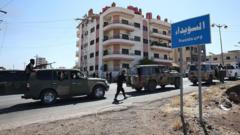The ongoing conflict in Ukraine raises questions about the true intent behind Vladimir Putin's declared ceasefires, with reactions from both sides highlighting skepticism and strategic implications.
Putin's Three-Day Ceasefire: Genuine Peace Effort or PR Move?

Putin's Three-Day Ceasefire: Genuine Peace Effort or PR Move?
A closer look at the implications and motivations behind Russia's latest ceasefire announcement.
In a recent announcement, Russian President Vladimir Putin declared a three-day unilateral ceasefire, scheduled from May 8 to May 10, coinciding with the commemoration of the 80th anniversary of the end of World War II. This decision follows a previous shorter ceasefire during Easter, which had seen both sides accusing each other of violations. The Kremlin cited "humanitarian" reasons for the ceasefire, implying an expectation for Ukraine to reciprocate, yet the response from Ukraine was one of skepticism.
Ukrainian Foreign Minister Andrii Sybiha questioned the necessity of waiting until May 8 for the ceasefire and demanded an immediate halt to hostilities. “If Russia truly wants peace, it must cease fire immediately," he stated, challenging the sincerity of the Kremlin's intentions. This response echoes a long-standing suspicion towards Moscow's declarations, often seen as strategic messaging rather than genuine attempts at peace.
The past interactions between the two nations lend credibility to this skepticism, highlighted by the allegations of ceasefire violations during the recent Easter truce. Critics in the Kremlin often frame these pauses in hostilities as attempts to paint Russia as the peacemaker, casting Ukraine in a negative light for not accepting what is presented as an olive branch.
Adding to the unfolding narrative, U.S. President Donald Trump expressed doubts about Putin's real intentions, remarking that the ongoing missile strikes in civilian areas suggest a lack of genuine interest in ending the war. In a recent post, Trump hinted at the need for tougher negotiations, potentially through financial or punitive measures. This viewpoint was echoed by White House Press Secretary Karoline Leavitt, who emphasized the administration's desire for a permanent ceasefire instead of temporary halt.
The strategic implications of Putin’s ceasefire maneuver are complex, as prominent Russian officials suggest that Ukraine may ultimately reject the proposal, raising questions about the potential for further escalation in the conflict. This dynamic points to a critical struggle not only on the battlefield but also in the arena of public perception and diplomatic relations, underscoring the challenges in reaching sustainable peace amid ongoing hostilities. As the war continues, both sides work within a narrative that complicates prospects for genuine resolution.
Ukrainian Foreign Minister Andrii Sybiha questioned the necessity of waiting until May 8 for the ceasefire and demanded an immediate halt to hostilities. “If Russia truly wants peace, it must cease fire immediately," he stated, challenging the sincerity of the Kremlin's intentions. This response echoes a long-standing suspicion towards Moscow's declarations, often seen as strategic messaging rather than genuine attempts at peace.
The past interactions between the two nations lend credibility to this skepticism, highlighted by the allegations of ceasefire violations during the recent Easter truce. Critics in the Kremlin often frame these pauses in hostilities as attempts to paint Russia as the peacemaker, casting Ukraine in a negative light for not accepting what is presented as an olive branch.
Adding to the unfolding narrative, U.S. President Donald Trump expressed doubts about Putin's real intentions, remarking that the ongoing missile strikes in civilian areas suggest a lack of genuine interest in ending the war. In a recent post, Trump hinted at the need for tougher negotiations, potentially through financial or punitive measures. This viewpoint was echoed by White House Press Secretary Karoline Leavitt, who emphasized the administration's desire for a permanent ceasefire instead of temporary halt.
The strategic implications of Putin’s ceasefire maneuver are complex, as prominent Russian officials suggest that Ukraine may ultimately reject the proposal, raising questions about the potential for further escalation in the conflict. This dynamic points to a critical struggle not only on the battlefield but also in the arena of public perception and diplomatic relations, underscoring the challenges in reaching sustainable peace amid ongoing hostilities. As the war continues, both sides work within a narrative that complicates prospects for genuine resolution.





















